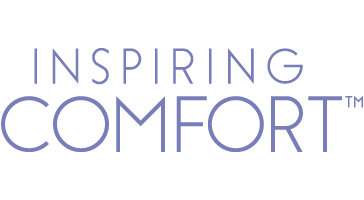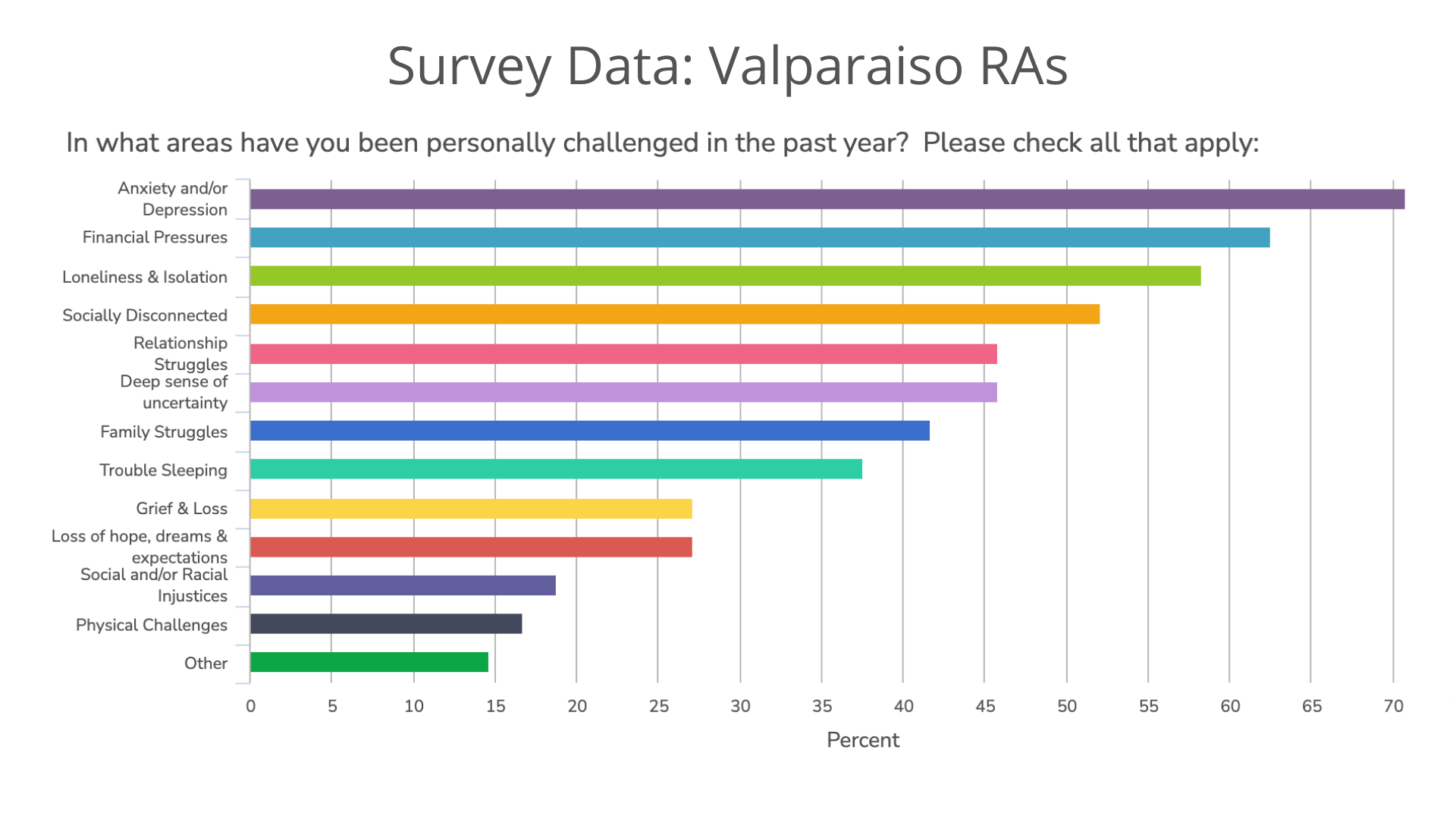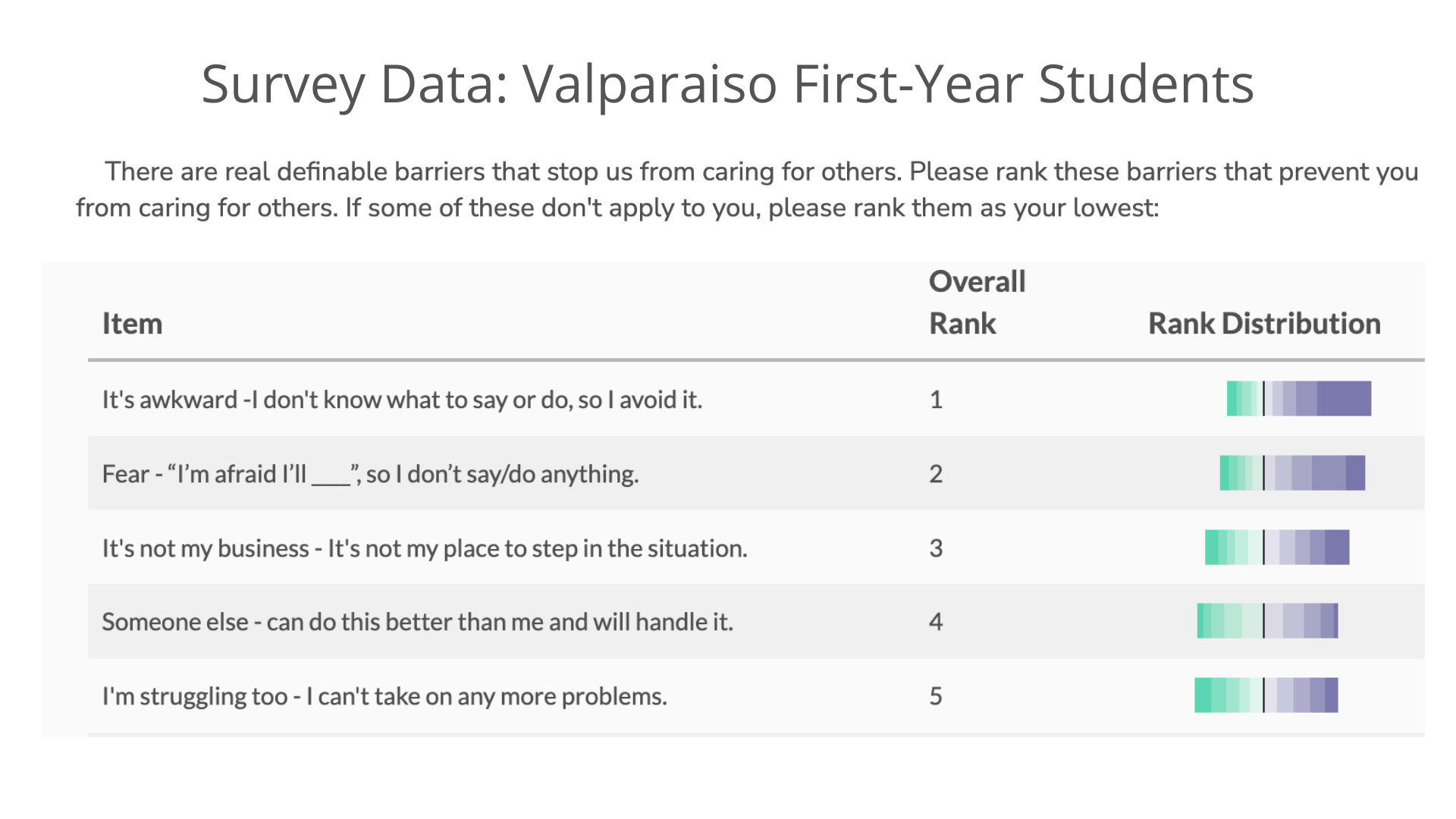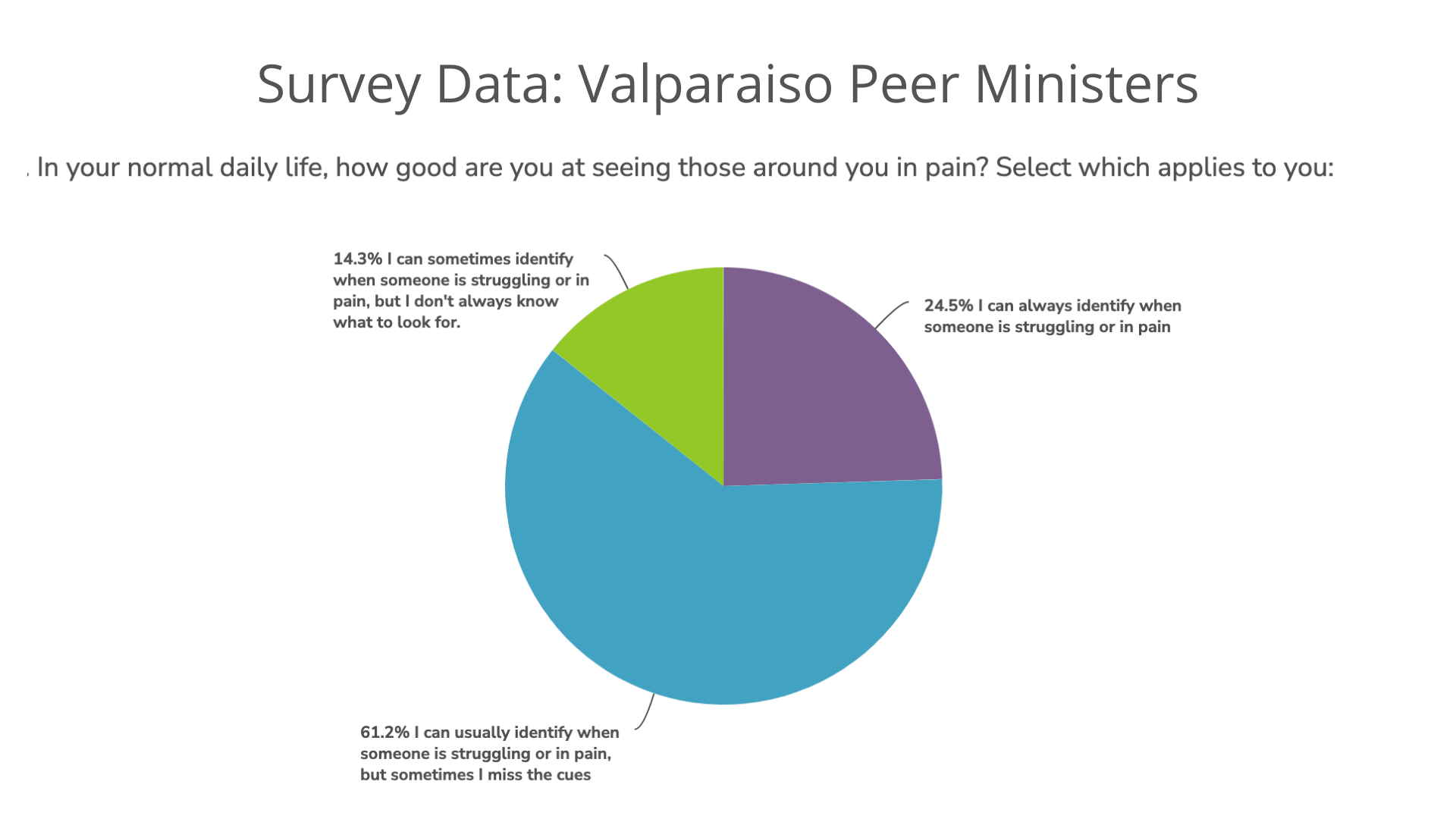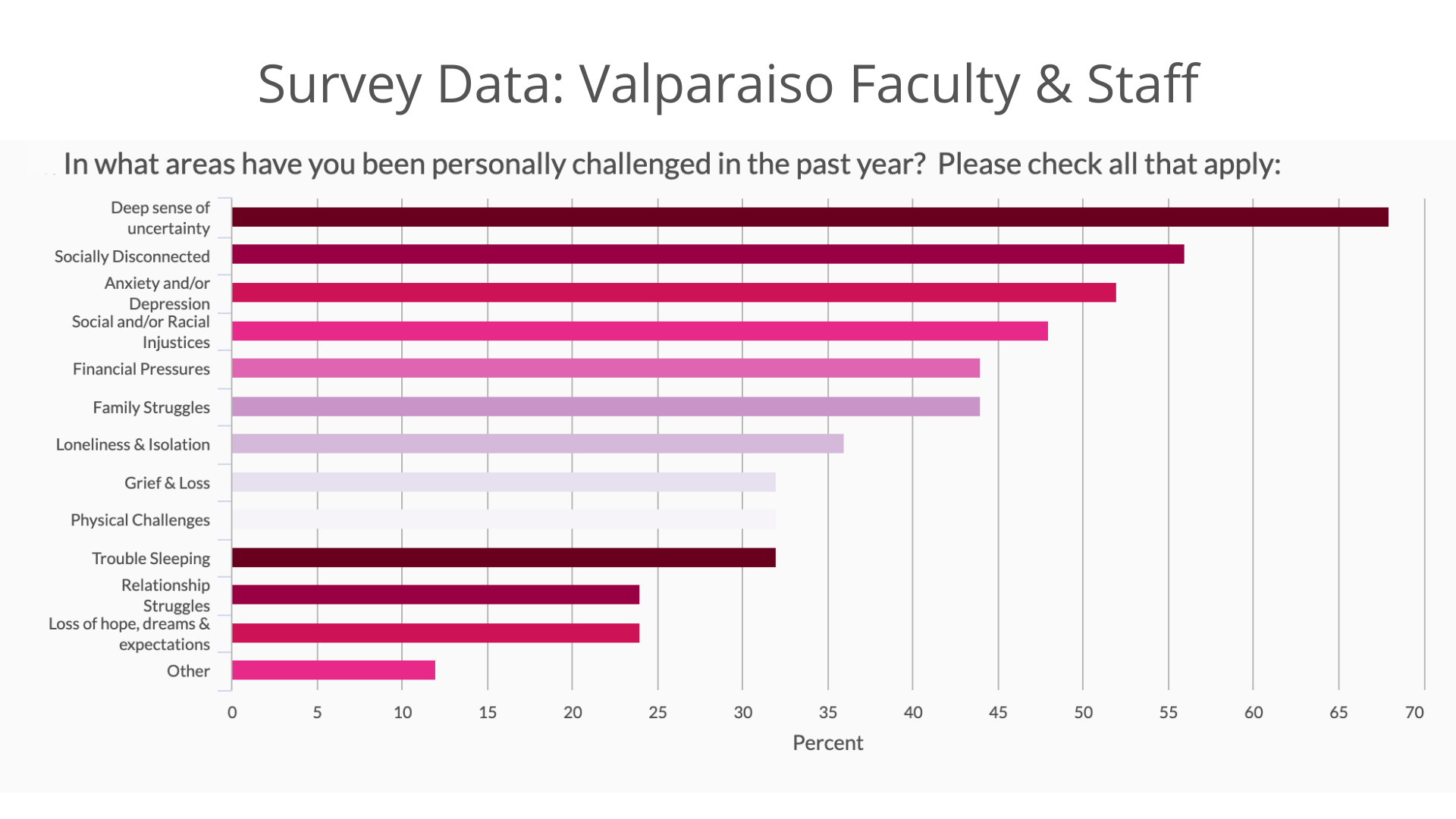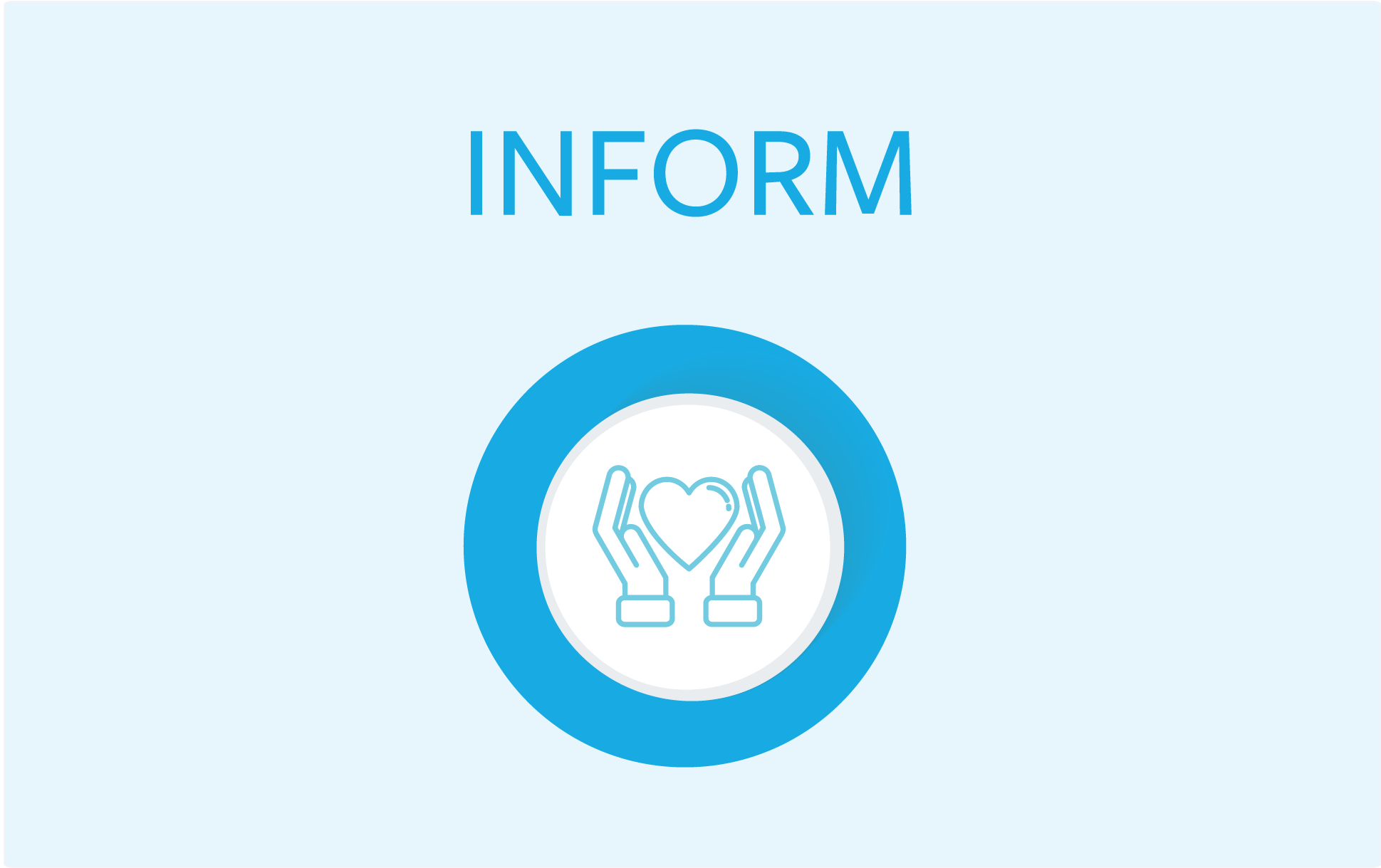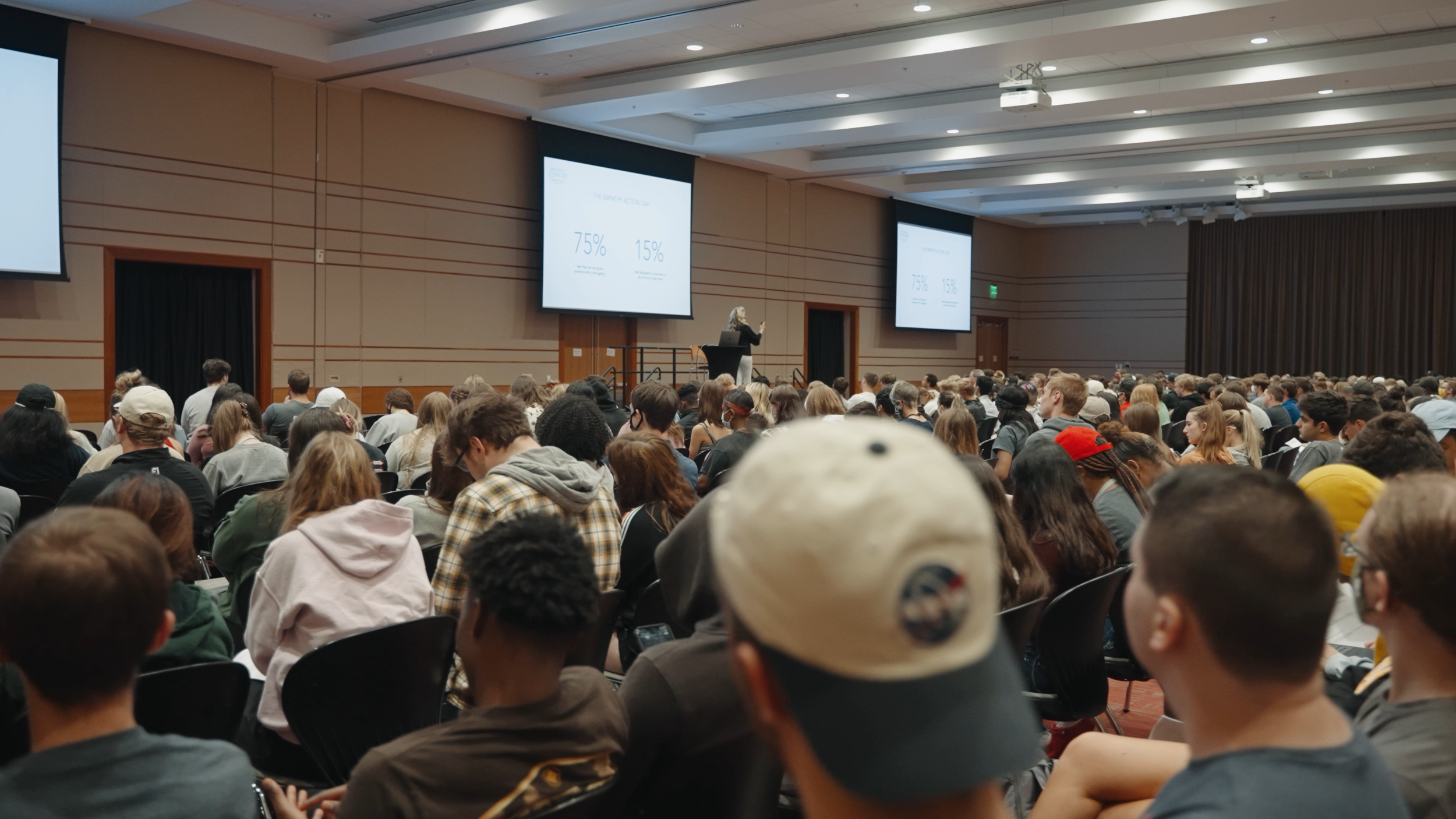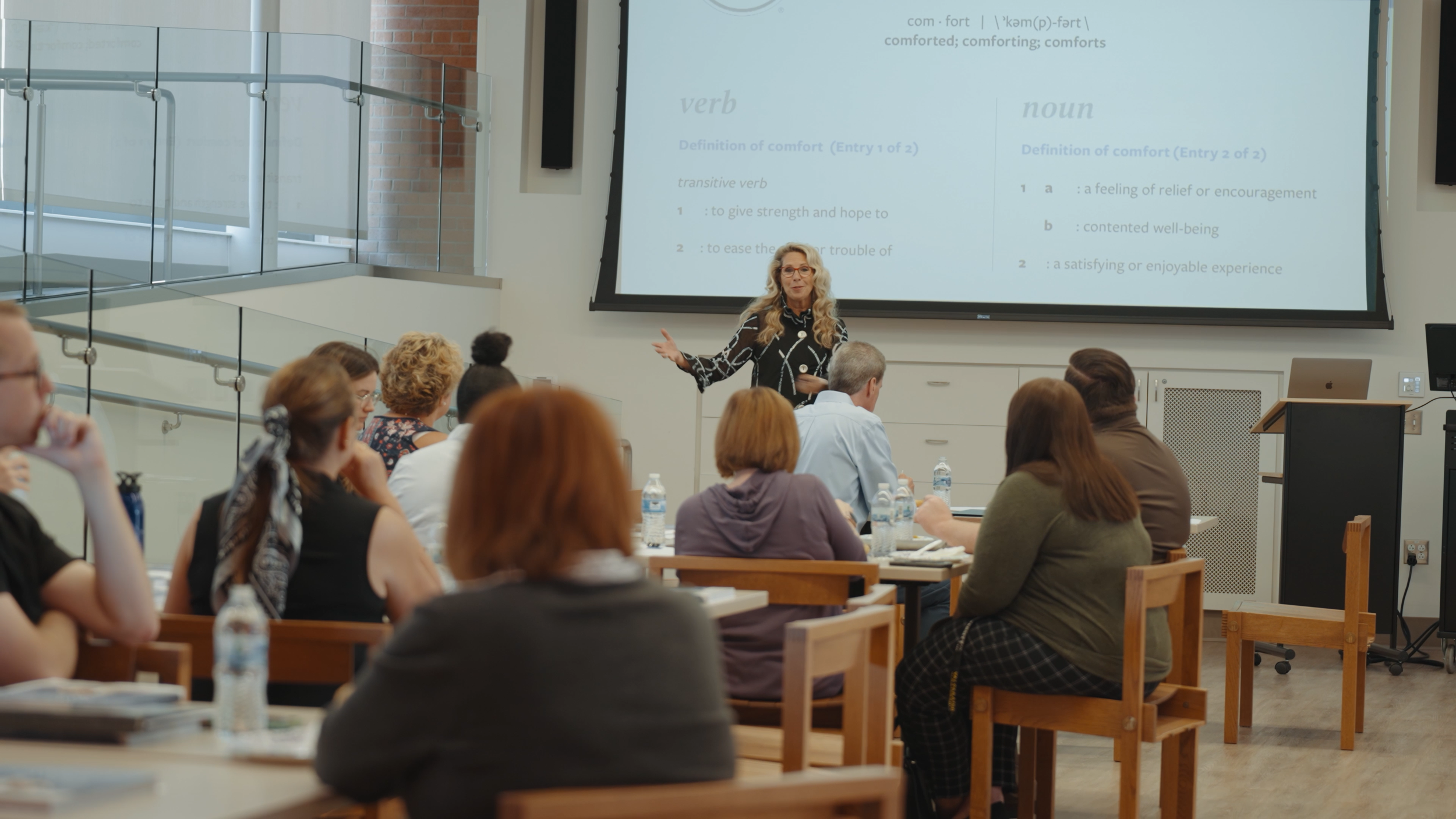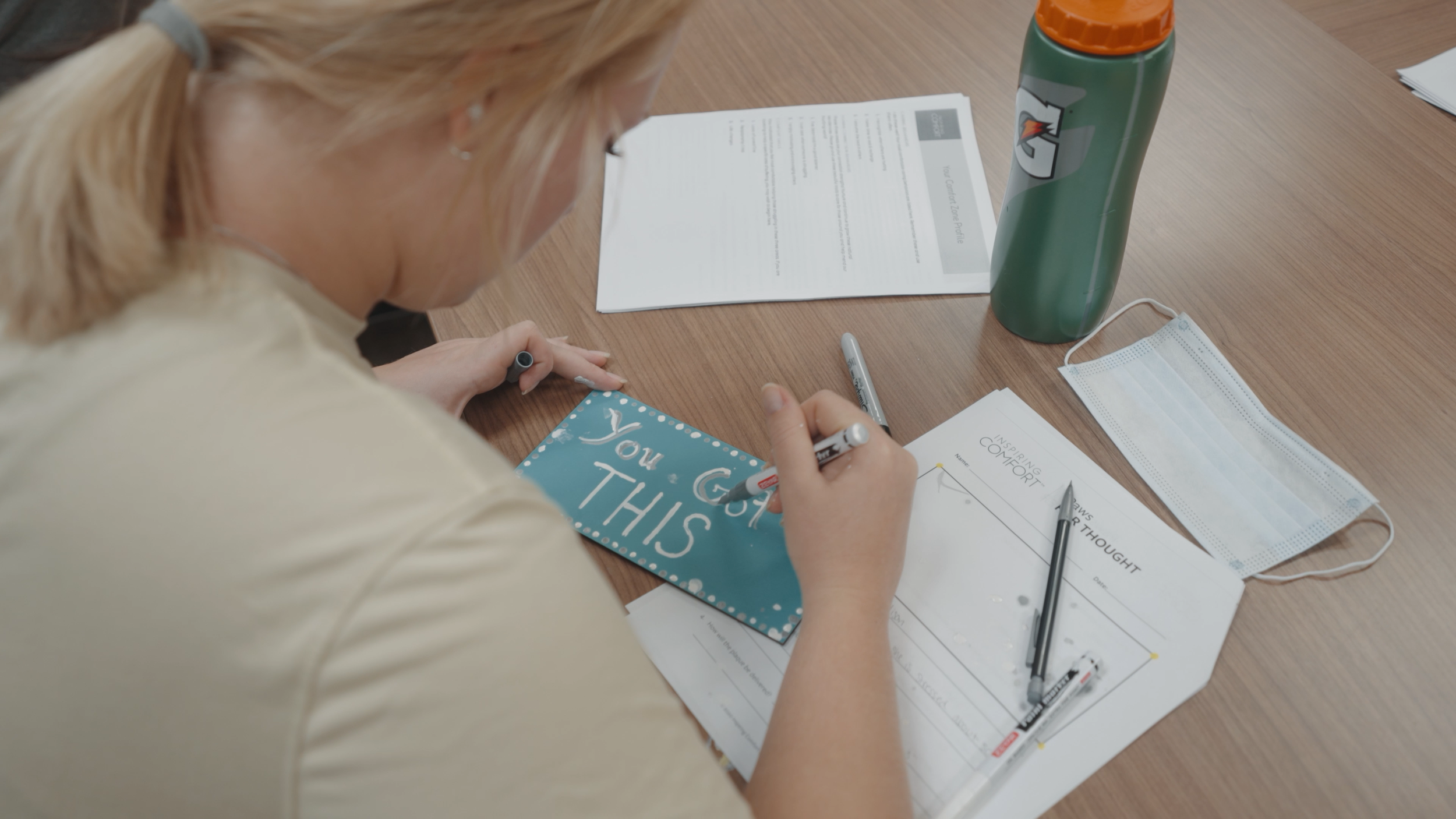Case Study: Valparaiso University
THE CLIENT
Valparaiso University is a private Lutheran university in Valparaiso, Indiana, with over 3100 students.
The university, fondly nicknamed “Valpo,” prides itself on its “bright, energetic spirit that attracts students who want to make a difference in this world.”
They feel that it is their responsibility to train the whole student - this includes skills of humanity and care.
THE PROBLEM
Valparaiso was looking for ways to bring a caring culture to their student population to draw in more students and retain the ones that are currently on campus. Amidst a nation-wide mental health crisis and growing isolation, anxieties, and depression on college campuses, the university wanted to set itself apart and tackle the problem at the root.
When we surveyed the students, faculty, staff, and peer leaders, the campus administration realized exactly how urgent the need for on-campus care was.
“I mean, when Jen shared that the vast majority of students here claimed that they could tell when somebody was struggling, and then the same vast majority of students said that when they’re struggling no one’s paying attention to it, that’s a really telling statistic,” recalled Pr. James Wetzstein, Director of the Peer Minister program on campus, “So we’re hoping that we can correct that.”
How is it possible that so many students felt able to see and empathize with others in pain, and yet so little felt seen when they struggled themselves?
The answer lay in the students’ aggregated survey data. The #1 barrier to caring was “It’s awkward: I don’t know what to say or do, so I avoid it.”
It’s a phenomenon called the Empathy-Action Gap: these students cared, but they were stuck in the Awkward Zone.
What the campus needed was the skills, tools, and strategies to show up and care. Five on-campus groups emerged in need of training:
First-year students were entering a completely new on-campus environment, an isolating experience in the midst of the COVID-19 pandemic, and needed extra support navigating new social connections.
Peer Ministers at Valparaiso serve as a liaison in all dormitories on campus and also in the Greek Life houses. They were looking to be more of a resource for students who are struggling on many levels with friends, grades, and life in general.
Resident Assistants were looking for deeper ways to support and care for the students beyond administrative duties, learning how to deal with situations as they arise with confidence and not be awkward.
Staff and Faculty were looking for ways to further support both each other and the students. There was a greater need for student support than ever before, and they were looking for tools and resources to know what to say and do.
Athletic Department was looking for team bonding activities to help teams going through extreme change.
Year One
In September 2021, we delivered a two-day immersive training at Valparaiso University to first-year students, Peer Ministers, sports teams, faculty, and staff.
All of Inspiring Comfort programs follow a 4 Step Process to cultivating care and connection:
Assess: First-year students, faculty and staff, Peer Ministers, Resident Assistants, and sports teams completed pre-surveys and personal assessments prior to training, and received both aggregated data for the campus and each individual group, as well as Personal Comfort Profile’s highlighting each individual’s care strengths and weaknesses.
Inform: A keynote address, given by Jen Marr, was delivered to first-year students, Peer Ministers, and faculty/staff.
Keynote to 600 first-year students at Valparaiso University.
Jen Marr training Valparaiso faculty and staff.
3. Equip: Workshops and trainings including:
90 Minute Faculty & Staff Training
Team Bonding Workshop for the Valparaiso softball team and coaches
“Breaking Through the Awkward Zone” Workshops for 650 first-year students, co-led by the newly certified on-campus Peer Ministers.
4. Cultivate: 14 Peer Ministers were certified to cultivate a culture of care on campus in the long-term. The Directors of the Peer Minister program intend to incorporate comfort training into their hiring process in the future, and continue to certify Peer Ministers every year.
A member of the Valpo softball team in our Team Connections Workshop.
A Valpo Peer Leader advises a fellow student.
Peer Ministers in training for their certifications.
Several months after the training, a trained Valparaiso student reached out to thank Jen after using the skills she learned to reach out and comfort another student. “A situation that I thought might pull me in too deep to have time for ended up being a well-needed night with others...sometimes it is just as easy as showing someone you care.”
In January of 2022, Inspiring Comfort returned to campus to train 50 RAs at Valparaiso University in creating a culture of care in their residence halls. This group of RAs went above and beyond, sharing stories, vulnerabilities, and their barriers to comfort, and creating personalized comfort plaques for one another to show each other they cared. Walking away from the Peer Leader Training, these RAs learned not only how to support students in their care, but also how to support each other.
After the successful rollout of programming in Year One, Valparaiso committed to continuing and expanding upon the program each year, with another full-campus training lined up in Fall of 2022.
Year Two
Building on the seeds planted in year one, Valparaiso continued building on the foundation of creating a culture of supportive care on campus, beginning the process of thorough integration in the long-term.
Pr. Kate Museus Dabay, Director of the Peer Minister Program at Valparaiso University’s campus, was trained as the resident Certified Organizational Trainer on campus. The six-week intensive training established Pr. Kate as a leader of supportive care on campus and allows her to facilitate presentations, workshops, and programs on campus, as well as fosters networks of collaboration with other leaders of care and connection across campuses and organizations nationwide.
To begin the 2022 school year, Inspiring Comfort returned to campus to once again certify that year’s cohort of Peer Ministers as Certified Peer Leader Trainers and leaders of supportive care on campus. Jen Marr returned to campus to present a keynote to all first-year students, which this year was incorporated into first-year orientation prior to the start of classes. Peer Ministers then facilitated the Awkward Zone Workshop to all first-year students as they settled into their dorms.
Pr. Kate Museus Dabay, Certified Organizational Trainer at Valparaiso University.
Valparaiso University’s faculty and staff engaged in a Discovery workshop.
Finally, Jen Marr gave a Discovery Workshop to members of Valparaiso’s faculty and staff, with a more than enthusiastic response for the Faculty and staff in particular were astounded by the data coming in from incoming first-year students — particularly, that when asked what would help them feel most cared for on campus, an overwhelming majority ranked “professors who are easy to engage with when needed” as #1.
Following the successful trainings in August of 2022, COT Pr. Kate Museus Dabay presented Inspiring Comfort’s work to the college’s President Council, receiving several offers of funding and ideas for future programs on campus. With funding acquired and enthusiasm for the program rampant across the college, Dabay initiated several programs across campus, including:
The faculty and staff workshop revealed a desire for greater connection and collaboration across departments at Valparaiso. As a result, Pr. Kate created a monthly deep-dive book study of Showing Up open to all faculty and staff. The book study was a smashing success, with regular attendance cross-departmentally to develop and strengthen both connections and the skills to show up both for one another and students on campus.
The President’s Council meeting identified that Valparaiso’s Physician Assistants were a group ripe for training in supportive care, as a group that prioritizes critical thinking, communication, leadership, and patient care. Pr. Kate trained this year’s cohort of PA’s in Showing Up and the Awkward Zone Workshop, ensuring that all of Valpo’s PA’s are trained to be on the cutting edge of actionable, compassionate patient care.
Showing Up skills, training, and activities were continued as regular practices of Valparaiso’s Peer Ministers, Pr. Kate, and faculty and staff at Valparaiso University. Signature comfort plaques and kits, beautiful expressions of care able to be created for someone in need of comfort, are made available for anyone who visits Pr. Kate’s office.
Valparaiso University’s 2022 class of certified Peer Ministers.
Jen Marr giving a presentation to 1 of 4 groups of first-year students at Valparaiso University.
Jen Marr with two first-year students at Valparaiso University.
Year Three
Jen Marr speaking to a class of over 650 incoming first-year students at Valparaiso University.
Jen Marr, Certified Organizational Trainer Pr. Kate Museus Dabay, and Valparaiso’s 2023 class of certified Peer Ministers.
Heading into the 2023 school year, Valparaiso University’s focus turns to sustaining and scaling the foundation of supportive care built over the past two years.
In August of 2023, Jen Marr returned to campus to train the third consecutive year’s cohort of Peer Ministers and certify them once again as Certified Peer Leader Trainers, able to facilitate workshops and provide supportive care to their peers and fellow students. Two weeks later, after the first-year students had a couple of weeks to settle into campus life, Jen Marr presented the Core keynote to over 650 first-year students. The keynote was followed by an Awkward Zone Workshop to help first-year students break through their barriers to care and connection, facilitated by the newly trained Peer Ministers.
Following the August training, Inspiring Comfort presented Valparaiso with their first Supportive Culture Scorecard — an overview of the data from their incoming first-year students. The comprehensive report outlines the following:
A comprehensive profile of the incoming Class of 2027 at Valparaiso University with a summary of data and outstanding statistics
What first-year students are worried and anxious about as they begin college life for the first time, including grades, expectations, mental health, and making friends
The personal challenges of incoming first-year students: including anxiety and depression, as well as exhaustion and burnout
The Empathy-to-Action Gap in first-year students: including what percentage can see and empathize when others are struggling, versus what percentage feel seen when they struggle
Rates of loneliness and isolation in incoming first-year students
Reasons that prevent incoming first-year students from opening up to others — data critical to mental health and suicide prevention across campus
Throughout the 23-24 academic year, Valparaiso continues to plan rolling out programming across campus as well as scaling and sustaining pre-existing programs. They will receive a yearly Supportive Culture Scorecard capturing the data of the incoming first-years, and perhaps expanding to capture the year-over-year data from all class years, faculty, and staff.
Outcomes
ON CAMPUS
✔️ Created a common language on campus for empathy, compassion, connection, and expressing struggles after training the majority of students consistently over three years.
Pr. James Wetzstein, Co-Director of the Valparaiso Peer Minister Program, says of the training: “The notion of planting seeds and building a common language — now we’ve got a campus-wide set of common perspectives. The fact that we were able to bring this skill-set to Peer Ministers, and to the Resident Assistants, puts into the residence halls a group of people with a common language and a common experience that can be there for students who are struggling.”
Pr. Kate Museus Dabay adds that both the training and the role of being a Certified Organizational Trainer on campus has given her a common language to connect with others on campus, regardless of if they’re involved in chapel life or not: “It catches on...it’s something we all care about, need, and desire. It’s hard to figure out how to be a university pastor to a campus, but Inspiring Comfort lets me be what I think a pastor is. I don’t have to talk about Jesus to help the campus be a caring community. This is my in.”
Valparaiso students engaged in a workshop.
✔️ Built a strong foundation for a long-term, consistent culture of care on campus
In three years of training and incorporating programs on campus, Valparaiso University has laid the foundation for a long-term, consistent culture of care. Starting next year, every single student on Valparaiso’s campus will have been reached with Inspiring Comfort’s training.
Pr. Dabay, who has played a major part in establishing this foundation on campus, says on the training’s impact: “This program, even if you do just a little bit, it’s the foundation to start building that culture on campus. The more you do, the more time you spend with it, the more it grows...soon we realized that this programming was too valuable to keep to only one area. We have now offered Inspiring Comfort training in a variety of ways. Most importantly, we have led all of our first-year students in the Awkward Zone Workshop for three years in a row. Because we lead this program at the beginning of the school year, it delivers the extra bonus of helping new students connect with one another as they have conversations about how to give and receive care – especially as they try to find their place in a new community.“
✔️ Students, faculty, and staff have the skills of identifying what’s stopping them from supporting others and are actively working on breaking through the awkwardness of it with their new acquired skills
Pr. Kate Museus Dabay says on this: “I’ve loved hearing stories about how students and colleagues have found themselves applying what they learned from Inspiring Comfort in their day-to-day lives, from remembering to focus on listening to others to going out of their way to offer comfort. Even the other pastors I’ve worked with have said that Inspiring Comfort training has helped them care for more for the people around them!“
✔️ Campus is more comfortable talking about mental health and how to support each other
Several faculty and staff, including Director of the Valparaiso Core Program Dr. Lisa Jennings and Pr. Kate Museus Dabay, emphasize that Inspiring Comfort’s hands-on, skill-based approach to supportive care has not only applied and partnered well with pre-existing work on campus, but encourages more open conversations around mental health by breaking the mold of only having self-care and clinical care through the counseling department available on campus. Pr. Kate Museus Dabay says on this: “Self-care is a buzzword these days, but self-care isn’t enough — we need a community of care.”
Dr. Lisa Jennings says of the training’s connection to the Core Program: “What’s great for my program is that Inspiring Comfort really fits into the curriculum that we had for this semester. Our curriculum is based around empathy and dialogue, so it fits in beautifully with Jen’s presentation and with her whole philosophy. What it actually does is give students an active way to think about empathy.” This “active way of thinking about empathy” encourages students to have conversations about mental health outside of themselves and outside of the classroom.
STUDENTS
✔️ Students feel empowered to help and support others and feel much more equipped to go out into a world in need of supportive care
Peer Minister Dahliah Wilkes, now a senior, has been a Peer Minister for three years and has experienced Inspiring Comfort’s Peer Leader Certification Training all three of those years as well. As a Peer Minister, she has insight into both the impact of the Peer Leader Certification and to the impact of this work on the student body as a whole.
Dahliah points to the direct feedback that she’s received from students on the effectiveness of the program: “They talked about how grateful they were to have received not only Jen’s keynote, but also the workshop and how they see it being useful for them in their four years and in interacting with their peers. I definitely got positive feedback that let me know not only were they paying attention, but they could see how it would be useful for them.”
On her own growth, she remarks: “If I could do this training for three more years I would!” As she prepares and for post-graduate opportunities, Dahliah reflects on how the training has prepared her for a world outside of college, acting as a natural unifier especially in groups with major differences:
Valparaiso first-year students listening to a keynote from Jen Marr.
“Sometimes when we think of showing up, we only think of people that look like us or are from the same country as us...and I think we can be so accustomed to doing things a certain way. But I’ve been able to utilize these skills with my international students...we have to remember to consider the audience. So I feel like I will be able to use this skills I use with students in Senegal [post-grad]. When students don’t feel seen or heard, I can use these skills that I’ve learned over the past three years with them as well.”
✔️ Students are more confident in having conversations with others and reaching out to others who are alone/struggling
Peer Minister Dahliah Wilkes has noticed a major impact on the behavior of students, particularly in their ability to break through the Awkward Zone: “What I’ve seen is...I’ll see students sitting by themselves, and you’ll see another student coming up like, ‘Hey, you wanna join us?’ And sometimes they may not even know the person at all, but they still go up to them and ask them.”
After a training of 50 RAs in Winter of 2022, one RA commented on how the training not only built confidence to reach out to others, but also the patience to build relationships and connections: “Mental health struggles are something that we kind of hide away from one another. So building that bridge takes time. It’s every single stone that we just lay across with someone. It takes time and effort.”
✔️ Students are more open with others about when they need support.
The data shared with Valparaiso’s incoming students year after year, particularly that more than 3 in 4 students wish they could be more open with others, has encouraged students of all class years to start opening up and asking for support from one another. Several Peer Ministers, in learning the skills of supportive care, have been able to encourage students to open up as well, even if they initially have their guard up or find it difficult to trust others.
Peer Minister Dahliah Wilkes recalls a moment during one workshop when a first-year student had an anxiety attack. While the other Peer Leader in charge continued to run the workshop, Dahliah stepped outside with the student: “I comforted her, I spoke to her, I gave her my number, and said to reach out in the future if she needs anything. She ended up reaching out, maybe a few weeks later...the fact that she reached out just shows this is really impacting the students because...from what she was telling me, reaching out was kind of hard for her. She didn’t really trust many people. But I feel like this training is inspiring people to reach out. I told her she could reach out, but she didn’t have to. But she did, and I really believe it’s due to what students have learned during this training.”
Two Valparaiso students walking and chatting together off campus.
✔️ There is a greater awareness of exactly just how many people are struggling, helping students feel less alone.
Seeing the data from their surveys, students have a heightened awareness that they are not the only ones struggling. This is especially powerful at the beginning of the school year for incoming students.
In Fall of 2023, after Jen Marr’s presentation an anonymous student approached Jen and said, “Thank you for that. I can’t believe how many of us are lonely.” Peer Ministers, faculty, and staff, and students in their feedback have confirmed that seeing the data has made them feel less alone in their struggles, and more encouraged to reach out and support others. Peer Minister Dahliah adds to this: “They’re realizing, wow, I’m not the only one who’s going through this. I feel like those statistics really hit home for people. Even for me, I had no idea how many people struggle with things that I have in the past.”
In facilitating a workshop for the commuter students, Pr. Dabay emphasized the impact of this community sharing that they were going through the same things with one another, and the realization that “even the ones that look like they’ve got it all together feel this way.” She recalls, “It became like a support group for the commuter students.”
PEER MINISTERS
✔️ Trained, certified, and solidified Peer Ministers as an on-the-ground support team for any student who needs peer support and care
Showing Up training has become fully integrated into Peer Minister training at Valparaiso University: it is considered in the hiring process, embedded into their pre-orientation training, incorporated into weekly meetings, used for residence hall activities, and perhaps most importantly, informs their work as a support team for students.
“It’s definitely impacted my work as a Peer Minister,” says Peer Minister Dahliah Wilkes on the training, “Each year I’ve grown in so many different ways...we have meetings every week, and we come together to talk. I’ve noticed so many PMs are coming back to this training and saying how they were able to come out of their comfort zones, and the challenges that they’ve faced and overcome.”
✔️ Peer Ministers have become more confident year after year in their ability to offer care and support to others
“We’re trained to help others learn how to comfort one another, but it also taught me something different each year. I feel like I grew each year,” Peer Minister Dahliah highlights. “There’s an [Awkward Zone] Assessment we take, and it shows your barriers that we have when comforting, and I noticed mine changed each year. This past training, I’ve seen how much I’ve grown in getting through those barriers. Each year I’ve grown in so many different ways.”
She mentions that after three years of the training, she’s also been able to take on a mentorship role with other Peer Ministers, supporting them in learning how to care for others and helping out when they feel stuck. This increases confidence not only for the Peer Ministers who are learning to navigate their own barriers, but for the Peer Ministers who are acting as mentors and stepping into more of a leadership role.
Peer Minister Dahliah Wilkes in her first year of certification training, Fall 2021. Now, having undergone three years of Peer Ministry and Peer Leader Training, Dahliah acts as a mentor and lead to other Peer Ministers.
✔️ After showing students that they truly care and showing up for them, Peer Ministers have received peer support in return from one another and from their students
Peer Minister Dahliah emphasizes how in caring for others, she’s received an abundance of supportive care back, filling up her cup in turn: “I’ve made it a mission of mine to check up on people: to ask them how they’re doing and clearly mean it. I’ve found myself getting that same treatment back each year, especially this year as I’ve been the Peer Minister for the international students. I feel like I’ve been receiving so much comfort myself from my residents. These past couple of days, I’ve been sick. There are times when I’ll get knocks on my door and they’ll give me food, or just check up on me, and it’s just been amazing. As I show compassion to them, they do it right back.“
FACULTY & STAFF
✔️ Strengthened connections and collaboration among faculty and staff across departments
In the Fall of 2022, Jen Marr returned to campus as part of a series of programs, one being to facilitate a Showing Up faculty and staff workshop. The workshop was not mandatory but was very well attended, uniquely bringing together a diverse group of faculty and staff from completely different departments, all with a vested interest in learning how to show up with supportive care.
The faculty and staff workshop revealed a desire for greater connection and collaboration across departments at Valparaiso — several faculty and staff came up to both Jen Marr and Pr. Kate Museus Dabay following the workshop and enthusiastically requested more opportunities to connect with colleagues across department. As a result, a cross-departmental monthly book study of Showing Up was implemented and continues to be highly attended by Valparaiso faculty and staff, creating and fortifying new connections and creating a fruitful space for collaboration.
Valparaiso faculty and staff in an intimate conversation with Jen and Dave Marr.
As lead of the faculty and staff book study, a staff member herself, and leader of other IC programs on Valpo’s campus, Pr. Kate Museus Dabay agrees the training has strengthened connections and collaborations among faculty and staff, breaking down silos and fulfilling a deep desire on campus for more connection amongst faculty and staff.
✔️ Faculty are breaking down silos and have more of a curiosity and desire to bridge the campus to a connected culture
Faculty and staff have expressed great enthusiasm for the programming on campus and have expressed a desire for more. This has come in the form of offering departmental funding, attending available workshops and trainings, incorporating the language of Showing Up into their everyday vernacular, using COT Pr. Kate Museus Dabay as a resource, and reaching out personally to the Inspiring Comfort team. Pr. Kate Museus Dabay reports that it is because of this enthusiasm that “we have big plans for continuing to offer Inspiring Comfort programming to students, faculty, and staff.”
A faculty member at Valparaiso reached out after training and emphasized the impact of the training on her personal and professional life: “[This] work is something our world desperately needs. As humans we have lost many of the ways we used to connect, yet we need each other to navigate this ever changing world.“
✔️ Heightened awareness of how to bridge the generational divide, the needs of today’s students, and skills of how to support students in today’s world
When faculty and staff saw the data that the #1 thing that would make students feel valued and cared for on campus was professors who care and are easy to engage with when needed, many were surprised. When painted the picture of what current generations in college and university are dealing with and how different their needs are from previous generations, though, it started to click.
Many faculty and staff were eager to learn the skills of how to support younger generations, citing a deep need for this kind of training in the midst of situations they currently didn’t know how to handle. For example, several of them had questions on “where the line was” between being firm and offering support, or mentioned feeling paralyzed in specific scenarios such as a student crying in their office.
After further training, the same faculty and staff commented that the training was very helpful in learning specific tools, tips, and strategies in how to support students and one another. Pr. Dabay emphasizes that faculty and staff often incorporate the language of Showing Up and the skills of care and connection into their conversations with one another.
Want a campus that shows up? Learn more about our college and university programming here.
